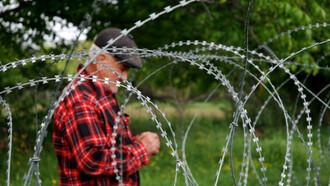Africa is now showing progress, and everyone seems to see this as a new dawn for the continent. However, unless things change, this is likely to be a disaster for the overwhelming number of ordinary Africans, leaving them for evermore as the working and labouring class in what are supposed to be their own countries.Talented and ambitious Africans are making their presence felt in many fields, albeit many of them abroad because they cannot yet get opportunities at home.
As Western governments and aid agencies have had half a century to show they can deal with these problems and all they have succeeded in doing is making them much worse, there is no point in bothering with them any longer, and it is time for an alternative approach, the Buy African, Build Africa (BABA).
According to the book, Africa—The Enslaved Continent, BABA is a new business initiative owned and run by indigenous Africans—not of influence (politicians, army or religious leaders, businesspeople, leaders of society)—set to create fast and massive change in their own countries and across Africa. The book is authored by David Barber from Uganda,the Pearl of Africa and the source of River Nile.
BABA is a dedication to all Africans who are frustrated because they, their nations, or their continent are being treated as second-class citizens of the world and who are totally committed to doing whatever is necessary to take Africa, its nations, and its great peoples to their rightful place of pride in the world. This is a movement to help ordinary Africans who want to give their children and grandchildren more than they had.
BABA is for Africans who want to see
- The peoples of Africa sharing the quality of life of those in advanced countries, thereby dealing with poverty in the best and most sustainable way.
- Their nations and Africa are taking their rightful place of pride in the world, free of their dependency on the west or east.
- Africans, not foreigners, control their businesses and job bases.
BABA has a quick and easy way to dramatically accelerate this by showing every African how they can play their part in helping to make a better life for themselves and their families. Is it possible? Yes. Actually, it turns out that going from below survival level to affluence in a matter of years is both normal and possible if enough people become committed to it.
After the Second World War, Japan took very few years to catch up with the West from a situation of complete devastation and without anything like the natural resources of Africa.
Again, in only a few decades, China has gone from an ‘African’ level of poverty to possibly ending up financially owning the whole world. The Asian Tigers and South American countries have also hit the high spots in relatively few years.
So if other countries have made huge strides quickly, why can’t Africa now do the same? The book presents huge shifts in attitude needed to create a solid business and job base.
The first shift in attitude to make is to stop simply accepting that foreigners or a small elite of Africans will own a disproportionate number of the best businesses and hold the best jobs. That explosion must consist mainly of African-owned, managed, and financed businesses.
The second shift in attitude to make is to understand that poverty in Africa only exists because ordinary Africans cooperate with it by doing nothing about it.
The fight against subsistence living and poverty has always been started and won by ordinary citizens, never by governments.
The next shift in attitude is to shop for African-made products instead of Western and Asian ones. This will create an explosion in businesses, jobs, pay, standards of living, and a reduction in poverty. Every product imported from the West or China actually robs Africa of jobs and keeps Africans in poverty, while at the same time increasing the jobs and wealth of the West or China.
The last big shift to make is an attitude toward investment. African governments are preoccupied with trying—without much success—to attract foreign investment and foreign-owned businesses instead of looking at what can be done in Africa. Both they and many experts believe Africa cannot progress without foreign investment.
Once Africa proves it can, on its own, create a serious base of these businesses, there will be no problem in attracting foreign investment for bigger projects. Another source of money is remittances from the Diaspora. Often, of course, there is no excess because the people who receive it need every cent to live. But there are members of the Diaspora who invest their money and have large investments outside Africa. The question is, if you will not invest in your own countries, why should anyone else?
"There is a major business explosion about to hit Africa. Unless we do something about it, it will be foreigners who benefit from that, leaving us, the laborers and workers, in what are supposed to be our own countries. BABA is also committed to ensuring that we Africans, not Westerners, Indians, or Chinese, own our businesses," believes Barber while posing the following questions to his fellow Africans:
- Are we buying goods from the West only because we automatically assume they are better than African-made ones?
- Why are we buying millions of liters of alcohol, soda, juice,juice and energy drinks a day when, surely, there must be someone somewhere in Africa who could make an alternative?
- Why is imported blended coffee the best-selling coffee in Africa? We sell the beans to the West in the first place to sell them back to us at a huge profit. We should be capable of creating several hundred African coffees that taste better.
- Why are imported teas the best sellers? We sell the leaves to the West in the first place to sell them back to us at a big profit.
- Why is imported toothpaste the top seller in Africa? Can’t we manufacture ours at half the cost?
- Why, when every can we buy helps to keep us in poverty, are we buying imported beers and lagers when we already brew our own?
- Why are shoes, clothes, and a huge range of other products from China now the best sellers in Africa when we can easily make them ourselves and keep all this profit and all those jobs for ourselves?
- Do we need most of our top hotels, game parks, and ranches to be under foreign ownership?
- Why are we selling large areas of African land to foreign countries and food producers when we can process the food ourselves and sell it to them?
- Worst of all, why are we giving foreign companies and countries the rights to mine our oil and natural resources? I agree we do not have the skills to mine, but all we have to do is employ the skills we need from the West or China and keep all the profit for ourselves. We are also asking you not to buy the worst form of imported counterfeit goods. I know they are cheap and save you money, but, unfortunately, we have no idea how much damage we do by buying them. The choice is this: Is it better to buy counterfeits, which have already cost tens of thousands of us our jobs and increased our poverty, as well as holding back our own standard of living? Or is it better to buy products made in Africa, which may cost more but will help everyone, including the poorest of us, to a better standard of living? Cheapness is actually China’s dagger in the back of Africa. You need to understand that African-made products will probably have to cost more because workers have to be paid more if they are to achieve high standards of pay and living—and that includes almost all of us because we also are employees and we all want to earn more! Bear in mind that Chinese companies pay slave wages, both to their own Chinese and African workers.
In closing,the book reveals that "Africans have a lot more money than people realize, as the mobile phone explosion has shown. Africa is easily the fastest-growing market for cellphones in the world. We are robbed on call charges because we pay a great deal more than the West, yet we can still afford to pay them! In urban areas, there is no shortage of vehicles or people able to pay high diesel and petrol costs".















